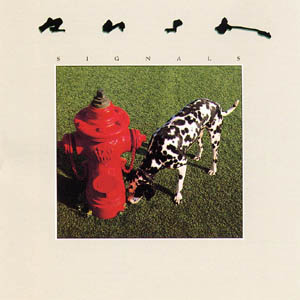I’ve been going through the entire catalog of Rush’s studio albums to hear how the band evolved and then I give my impression of each album. Today, Signals.
Signals

The Signals album represents a radical shift in the style of music the band plays. While I would have liked to see the same mix and style they used in Moving Pictures last a little longer, Rush has never been a band to stagnate. They are always exploring new ideas and new styles of music.
This album ushers in the full-blown keyboard era. Most of the overdrive on Alex’s guitar disappears, replaced by a more ringing sound. It’s a radical departure from anything they had done previously, and it takes an open mind to listen to the album.
This album marks a long stretch of material I only superficially kno, so most of what appears on the albums between Signals and Vapor Trails is brand new to me, except what I have heard in concert DVDs and CDs. Frankly, other than the two tracks I already knew, I didn’t like this album at first. That isn’t unusual, though. Most of the band’s material I don’t like the first time I hear it, then it grows on me. That happened here also, and I kept the CD in the car longer than most of the previous albums to give the songs the chance to get over that initial resistance.
In reality, to enjoy this album one must forget all the albums that come before it, because it’s that different. If you are expecting something along the lines of 2112, you will be very disappointed. But that doesn’t make it a bad album, just different.
The Tracks
1. Subdivisions 5:33
This is one of my favorite songs from the band’s synth era because it speaks to me. It’s remarkably powerful lyrics and the well-arranged instrumentation allowed this song considerable radio air time (though for some reason that seemed to occur well after the album was released). The song gets an A.
2. The Analog Kid 4:47
The guitar riffs in this song channel the band’s first album. It sounds a lot like Finding My Way. It’s definitely its own song, though. The riffs are the extent of the similarity. It’s one of the faster-paced songs on the album and uses a lot less keyboard than most, although the keyboard is integral to the arrangement. Overall, though, I don’t find any resonance with this song and it doesn’t seem to have anything special to it. I give it a B+.
3. Chemistry 4:57
This is an interesting song, and one that requires a careful reading of the lyrics to get the full impact. Some of what you hear is easily misinterpreted as the wrong homophone. I give the song an A-.
4. Digital Man 6:20
Inclusion in some live performance recordings gave this song a bit more visibility than it might otherwise have found. It’s fairly long for radio play–other than Working Man, most of the band’s radio hits were under 5 minutes long. But, this song is fairly typical of Rush hitting its stride with the new sound they began with this album, and it’s a good song. I give it an A.
5. The Weapon 6:23
If any song on this album approaches the sound Rush achieved with Moving Pictures, it’s this one. That said, it’s distinctly different from the previous album because it has the same feel as the rest of Signals. Despite it being less-known than the two songs that received radio airtime, this is probably the best song on the album. I give it an A.
6. New World Man 3:42
This is the most well-known song from the album. It received plenty of radio play in its day. The smooth sound and lyrics with a message seems to resonate. I give the song an A.
7. Losing It 4:52
A guest musician, Ben Mink, plays electric violin on this track. The lyrics are some of the darkest to appear on any album up to this point. It’s all about losing skills and talents as you age. There’s a very different kind of guitar solo in this song that’s more reminiscent of early Pink Floyd than anything Alex Lifeson did previously. It isn’t credited, but slide guitar is clearly heard. That’s something Alex hadn’t used since Fly by Night. It’s a powerful song but not the easiest listen. I give it an A-.
8. Countdown 5:50
This is one of those songs that’s a fun listen, but only in a cerebral way. It’s obvious that Neil Peart wrote this song after witnessing the launch of a space shuttle, and it describes his observations. The song is loaded with NASA mission control chatter, which adds to the character and feel of the song. A satisfying listen, but it’s not a repeat play, nor is it something that will be played at many parties. It’s just a song they needed to record, and they did a credible job of it. I give it an A-.
Conclusion
While this album features a sound that was unfamiliar to Rush fans up to this point, it does represent the launch point of a new direction and of musical exploration for the band. It’s a good album–not their best, not even the best of the synth era, but still it’s good. I give the album an A-.
I gave Moving Pictures an A+.
I gave Permanent Waves an A.
I gave Hemispheres an A+.
I gave A Farewell to Kings and A.
I gave 2112 an A.
I gave Caress of Steel a B+.
I gave Fly by Night an A-.
I gave Rush a C+.





Pingback: My Impression of Grace Under Pressure - Entropy Central